浅谈如何提高英语听力
- 格式:docx
- 大小:20.25 KB
- 文档页数:4

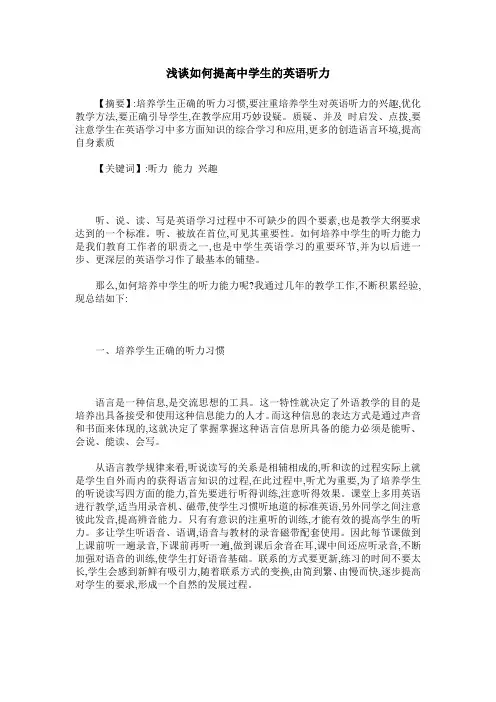
浅谈如何提高中学生的英语听力【摘要】:培养学生正确的听力习惯,要注重培养学生对英语听力的兴趣,优化教学方法,要正确引导学生,在教学应用巧妙设疑。
质疑、并及时启发、点拨,要注意学生在英语学习中多方面知识的综合学习和应用,更多的创造语言环境,提高自身素质【关键词】:听力能力兴趣听、说、读、写是英语学习过程中不可缺少的四个要素,也是教学大纲要求达到的一个标准。
听、被放在首位,可见其重要性。
如何培养中学生的听力能力是我们教育工作者的职责之一,也是中学生英语学习的重要环节,并为以后进一步、更深层的英语学习作了最基本的铺垫。
那么,如何培养中学生的听力能力呢?我通过几年的教学工作,不断积累经验,现总结如下:一、培养学生正确的听力习惯语言是一种信息,是交流思想的工具。
这一特性就决定了外语教学的目的是培养出具备接受和使用这种信息能力的人才。
而这种信息的表达方式是通过声音和书面来体现的,这就决定了掌握掌握这种语言信息所具备的能力必须是能听、会说、能读、会写。
从语言教学规律来看,听说读写的关系是相辅相成的,听和读的过程实际上就是学生自外而内的获得语言知识的过程,在此过程中,听尤为重要,为了培养学生的听说读写四方面的能力,首先要进行听得训练,注意听得效果。
课堂上多用英语进行教学,适当用录音机、磁带,使学生习惯听地道的标准英语,另外同学之间注意彼此发音,提高辨音能力。
只有有意识的注重听的训练,才能有效的提高学生的听力。
多让学生听语音、语调,语音与教材的录音磁带配套使用。
因此每节课做到上课前听一遍录音,下课前再听一遍,做到课后余音在耳,课中间还应听录音,不断加强对语音的训练,使学生打好语音基础。
联系的方式要更新,练习的时间不要太长,学生会感到新鲜有吸引力,随着联系方式的变换,由简到繁、由慢而快,逐步提高对学生的要求,形成一个自然的发展过程。
二、要注重培养学生对英语听力的兴趣有位名人曾说过:“兴趣是最好的教师。
”如果一个根本没入门,对英语学习很厌烦的学生,培养其英语听力能力,其难度是可想而知的。

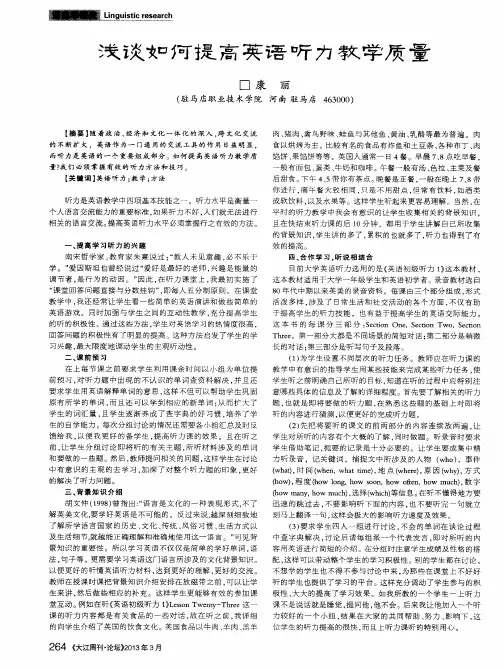
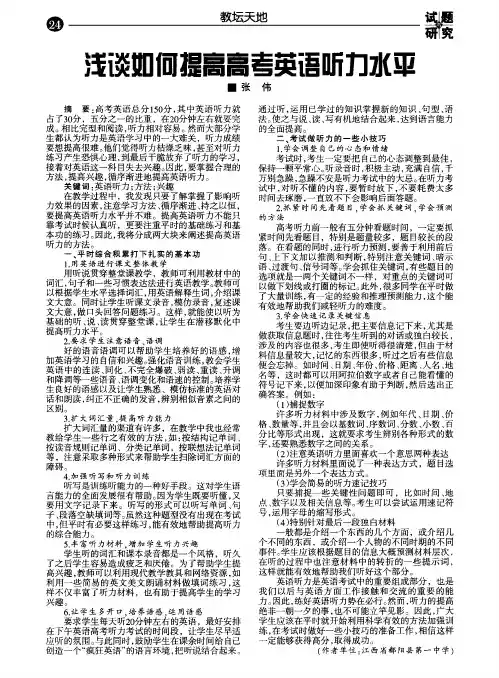
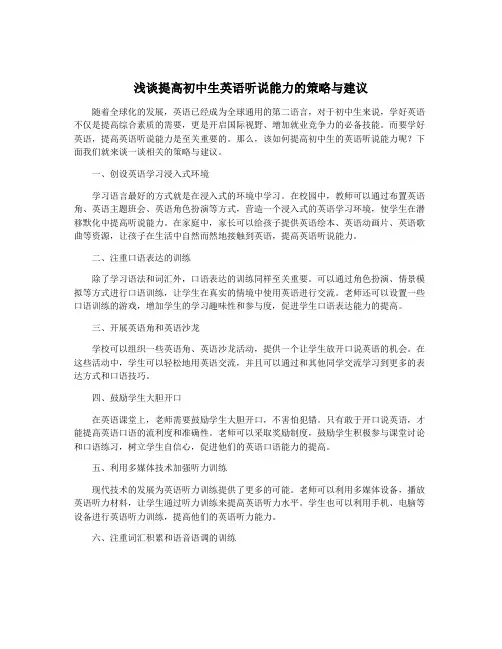
浅谈提高初中生英语听说能力的策略与建议随着全球化的发展,英语已经成为全球通用的第二语言,对于初中生来说,学好英语不仅是提高综合素质的需要,更是开启国际视野、增加就业竞争力的必备技能。
而要学好英语,提高英语听说能力是至关重要的。
那么,该如何提高初中生的英语听说能力呢?下面我们就来谈一谈相关的策略与建议。
一、创设英语学习浸入式环境学习语言最好的方式就是在浸入式的环境中学习。
在校园中,教师可以通过布置英语角、英语主题班会、英语角色扮演等方式,营造一个浸入式的英语学习环境,使学生在潜移默化中提高听说能力。
在家庭中,家长可以给孩子提供英语绘本、英语动画片、英语歌曲等资源,让孩子在生活中自然而然地接触到英语,提高英语听说能力。
二、注重口语表达的训练除了学习语法和词汇外,口语表达的训练同样至关重要。
可以通过角色扮演、情景模拟等方式进行口语训练,让学生在真实的情境中使用英语进行交流。
老师还可以设置一些口语训练的游戏,增加学生的学习趣味性和参与度,促进学生口语表达能力的提高。
三、开展英语角和英语沙龙学校可以组织一些英语角、英语沙龙活动,提供一个让学生放开口说英语的机会。
在这些活动中,学生可以轻松地用英语交流,并且可以通过和其他同学交流学习到更多的表达方式和口语技巧。
四、鼓励学生大胆开口在英语课堂上,老师需要鼓励学生大胆开口,不害怕犯错。
只有敢于开口说英语,才能提高英语口语的流利度和准确性。
老师可以采取奖励制度,鼓励学生积极参与课堂讨论和口语练习,树立学生自信心,促进他们的英语口语能力的提高。
五、利用多媒体技术加强听力训练现代技术的发展为英语听力训练提供了更多的可能。
老师可以利用多媒体设备,播放英语听力材料,让学生通过听力训练来提高英语听力水平。
学生也可以利用手机、电脑等设备进行英语听力训练,提高他们的英语听力能力。
六、注重词汇积累和语音语调的训练除了听力和口语训练外,词汇积累和语音语调的训练也是提高英语听说能力的重要环节。
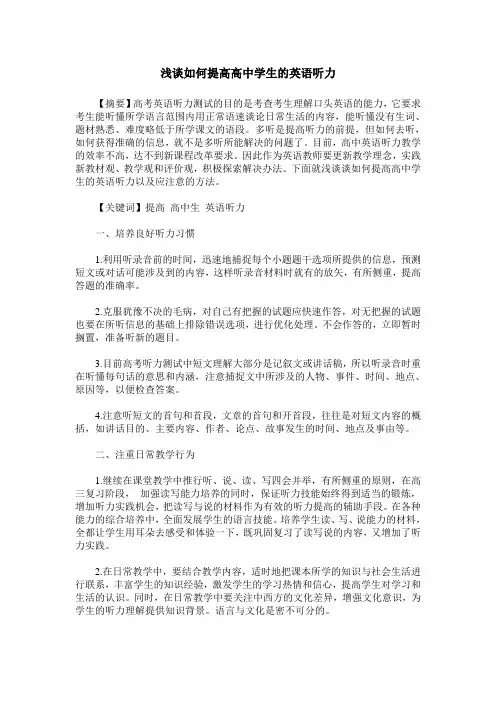
浅谈如何提高高中学生的英语听力【摘要】高考英语听力测试的目的是考查考生理解口头英语的能力,它要求考生能听懂所学语言范围内用正常语速谈论日常生活的内容,能听懂没有生词、题材熟悉、难度略低于所学课文的语段。
多听是提高听力的前提,但如何去听,如何获得准确的信息,就不是多听所能解决的问题了。
目前,高中英语听力教学的效率不高,达不到新课程改革要求。
因此作为英语教师要更新教学理念,实践新教材观、教学观和评价观,积极探索解决办法。
下面就浅谈谈如何提高高中学生的英语听力以及应注意的方法。
【关键词】提高高中生英语听力一、培养良好听力习惯1.利用听录音前的时间,迅速地捕捉每个小题题干选项所提供的信息,预测短文或对话可能涉及到的内容,这样听录音材料时就有的放矢,有所侧重,提高答题的准确率。
2.克服犹豫不决的毛病,对自己有把握的试题应快速作答,对无把握的试题也要在所听信息的基础上排除错误选项,进行优化处理。
不会作答的,立即暂时搁置,准备听新的题目。
3.目前高考听力测试中短文理解大部分是记叙文或讲话稿,所以听录音时重在听懂每句话的意思和内涵,注意捕捉文中所涉及的人物、事件、时间、地点、原因等,以便检查答案。
4.注意听短文的首句和首段,文章的首句和开首段,往往是对短文内容的概括,如讲话目的、主要内容、作者、论点、故事发生的时间、地点及事由等。
二、注重日常教学行为1.继续在课堂教学中推行听、说、读、写四会并举,有所侧重的原则,在高三复习阶段,加强读写能力培养的同时,保证听力技能始终得到适当的锻炼,增加听力实践机会,把读写与说的材料作为有效的听力提高的辅助手段。
在各种能力的综合培养中,全面发展学生的语言技能。
培养学生读、写、说能力的材料,全都让学生用耳朵去感受和体验一下,既巩固复习了读写说的内容,又增加了听力实践。
2.在日常教学中,要结合教学内容,适时地把课本所学的知识与社会生活进行联系,丰富学生的知识经验,激发学生的学习热情和信心,提高学生对学习和生活的认识。
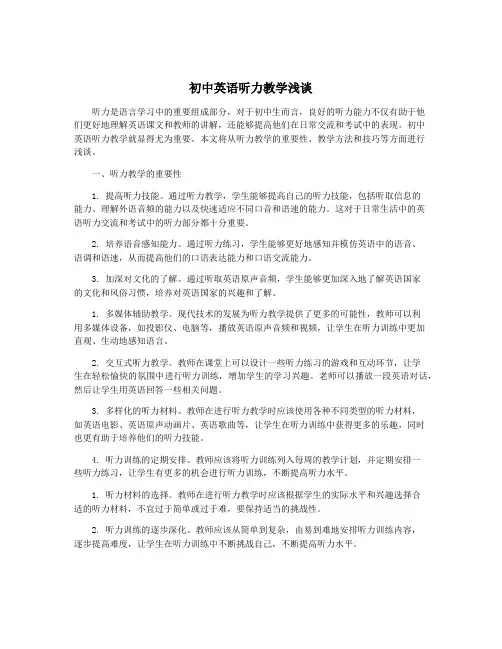
初中英语听力教学浅谈听力是语言学习中的重要组成部分,对于初中生而言,良好的听力能力不仅有助于他们更好地理解英语课文和教师的讲解,还能够提高他们在日常交流和考试中的表现。
初中英语听力教学就显得尤为重要。
本文将从听力教学的重要性、教学方法和技巧等方面进行浅谈。
一、听力教学的重要性1. 提高听力技能。
通过听力教学,学生能够提高自己的听力技能,包括听取信息的能力、理解外语音频的能力以及快速适应不同口音和语速的能力。
这对于日常生活中的英语听力交流和考试中的听力部分都十分重要。
2. 培养语音感知能力。
通过听力练习,学生能够更好地感知并模仿英语中的语音、语调和语速,从而提高他们的口语表达能力和口语交流能力。
3. 加深对文化的了解。
通过听取英语原声音频,学生能够更加深入地了解英语国家的文化和风俗习惯,培养对英语国家的兴趣和了解。
1. 多媒体辅助教学。
现代技术的发展为听力教学提供了更多的可能性,教师可以利用多媒体设备,如投影仪、电脑等,播放英语原声音频和视频,让学生在听力训练中更加直观、生动地感知语言。
2. 交互式听力教学。
教师在课堂上可以设计一些听力练习的游戏和互动环节,让学生在轻松愉快的氛围中进行听力训练,增加学生的学习兴趣。
老师可以播放一段英语对话,然后让学生用英语回答一些相关问题。
3. 多样化的听力材料。
教师在进行听力教学时应该使用各种不同类型的听力材料,如英语电影、英语原声动画片、英语歌曲等,让学生在听力训练中获得更多的乐趣,同时也更有助于培养他们的听力技能。
4. 听力训练的定期安排。
教师应该将听力训练列入每周的教学计划,并定期安排一些听力练习,让学生有更多的机会进行听力训练,不断提高听力水平。
1. 听力材料的选择。
教师在进行听力教学时应该根据学生的实际水平和兴趣选择合适的听力材料,不宜过于简单或过于难,要保持适当的挑战性。
2. 听力训练的逐步深化。
教师应该从简单到复杂,由易到难地安排听力训练内容,逐步提高难度,让学生在听力训练中不断挑战自己,不断提高听力水平。
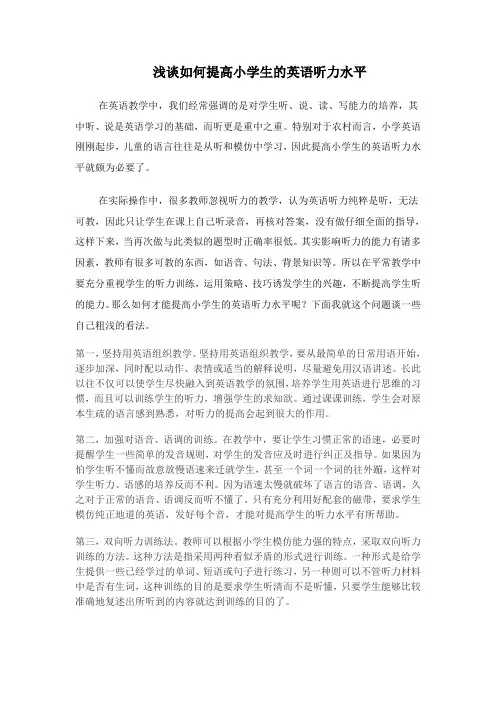
浅谈如何提高小学生的英语听力水平在英语教学中,我们经常强调的是对学生听、说、读、写能力的培养,其中听、说是英语学习的基础,而听更是重中之重。
特别对于农村而言,小学英语刚刚起步,儿童的语言往往是从听和模仿中学习,因此提高小学生的英语听力水平就颇为必要了。
在实际操作中,很多教师忽视听力的教学,认为英语听力纯粹是听,无法可教,因此只让学生在课上自己听录音,再核对答案,没有做仔细全面的指导,这样下来,当再次做与此类似的题型时正确率很低。
其实影响听力的能力有诸多因素,教师有很多可教的东西,如语音、句法、背景知识等。
所以在平常教学中要充分重视学生的听力训练,运用策略、技巧诱发学生的兴趣,不断提高学生听的能力。
那么如何才能提高小学生的英语听力水平呢?下面我就这个问题谈一些自己粗浅的看法。
第一,坚持用英语组织教学。
坚持用英语组织教学,要从最简单的日常用语开始,逐步加深,同时配以动作、表情或适当的解释说明,尽量避免用汉语讲述。
长此以往不仅可以使学生尽快融入到英语教学的氛围,培养学生用英语进行思维的习惯,而且可以训练学生的听力,增强学生的求知欲。
通过课课训练,学生会对原本生疏的语言感到熟悉,对听力的提高会起到很大的作用。
第二,加强对语音、语调的训练。
在教学中,要让学生习惯正常的语速,必要时提醒学生一些简单的发音规则,对学生的发音应及时进行纠正及指导。
如果因为怕学生听不懂而故意放慢语速来迁就学生,甚至一个词一个词的往外蹦,这样对学生听力、语感的培养反而不利。
因为语速太慢就破坏了语言的语音、语调,久之对于正常的语音、语调反而听不懂了。
只有充分利用好配套的磁带,要求学生模仿纯正地道的英语,发好每个音,才能对提高学生的听力水平有所帮助。
第三,双向听力训练法。
教师可以根据小学生模仿能力强的特点,采取双向听力训练的方法。
这种方法是指采用两种看似矛盾的形式进行训练。
一种形式是给学生提供一些已经学过的单词、短语或句子进行练习,另一种则可以不管听力材料中是否有生词,这种训练的目的是要求学生听清而不是听懂,只要学生能够比较准确地复述出所听到的内容就达到训练的目的了。
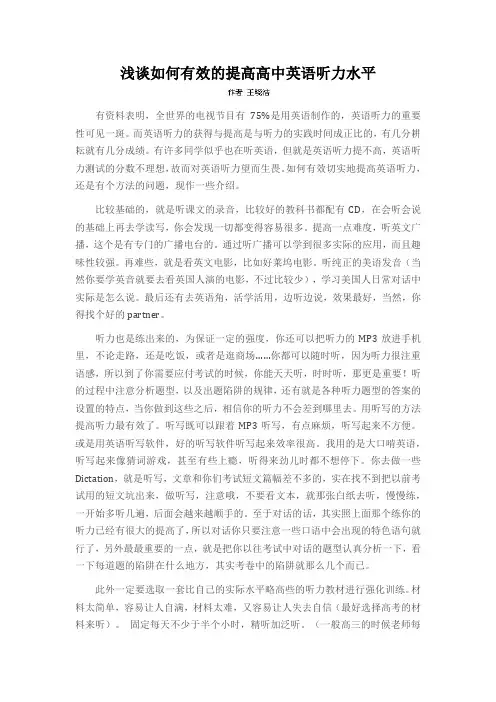
浅谈如何有效的提高高中英语听力水平有资料表明,全世界的电视节目有75%是用英语制作的,英语听力的重要性可见一斑。
而英语听力的获得与提高是与听力的实践时间成正比的,有几分耕耘就有几分成绩。
有许多同学似乎也在听英语,但就是英语听力提不高,英语听力测试的分数不理想,故而对英语听力望而生畏。
如何有效切实地提高英语听力,还是有个方法的问题,现作一些介绍。
比较基础的,就是听课文的录音,比较好的教科书都配有CD,在会听会说的基础上再去学读写,你会发现一切都变得容易很多。
提高一点难度,听英文广播,这个是有专门的广播电台的。
通过听广播可以学到很多实际的应用,而且趣味性较强。
再难些,就是看英文电影,比如好莱坞电影。
听纯正的美语发音(当然你要学英音就要去看英国人演的电影,不过比较少),学习美国人日常对话中实际是怎么说。
最后还有去英语角,活学活用,边听边说,效果最好,当然,你得找个好的partner。
听力也是练出来的,为保证一定的强度,你还可以把听力的MP3放进手机里,不论走路,还是吃饭,或者是逛商场……你都可以随时听,因为听力很注重语感,所以到了你需要应付考试的时候,你能天天听,时时听,那更是重要!听的过程中注意分析题型,以及出题陷阱的规律,还有就是各种听力题型的答案的设置的特点,当你做到这些之后,相信你的听力不会差到哪里去。
用听写的方法提高听力最有效了。
听写既可以跟着MP3听写,有点麻烦,听写起来不方便。
或是用英语听写软件,好的听写软件听写起来效率很高。
我用的是大口啃英语,听写起来像猜词游戏,甚至有些上瘾,听得来劲儿时都不想停下。
你去做一些Dictation,就是听写,文章和你们考试短文篇幅差不多的,实在找不到把以前考试用的短文坑出来,做听写,注意哦,不要看文本,就那张白纸去听,慢慢练,一开始多听几遍,后面会越来越顺手的。
至于对话的话,其实照上面那个练你的听力已经有很大的提高了,所以对话你只要注意一些口语中会出现的特色语句就行了,另外最最重要的一点,就是把你以往考试中对话的题型认真分析一下,看一下每道题的陷阱在什么地方,其实考卷中的陷阱就那么几个而已。
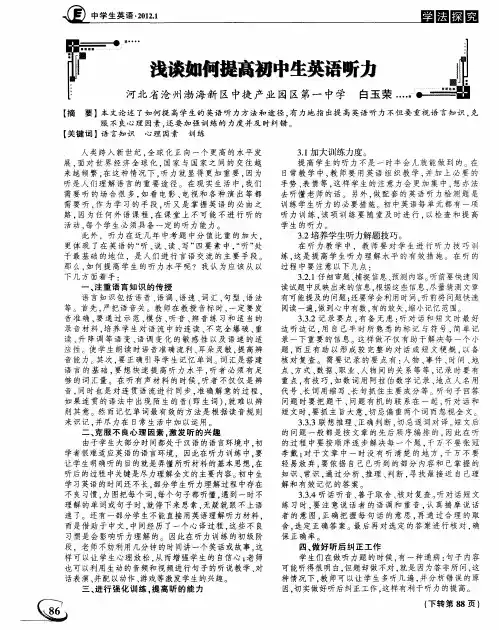
浅谈如何提高高中英语听力课堂效率多数研究者把听力与口语教学作为独立的两个领域来研究,并未认识到听力技能与口语技能的训练是学生整个语言技能训练中不可分割的整体,即多数研究者并未充分认识到听与说之间存在着互相促进的关系。
听与说是语言的输入与输出,在进行大量、丰富、真实的语言材料输入的同时,必须通过大量的语言交际活动,才能实现从语言知识到语言能力的转化。
多数研究只是从理论的角度来探讨问题及问题的解决方法,真正应用于课堂实践的为数不多,因此,理论能否指导实践还不确定。
这是实践研究的不足。
由此,要想切实有效地解决学生听力能力低下的问题,必须在理论和实践两个方面进一步进行研究。
一、目前英语听力课训练的弊端长期以来,我国高中英语听力课训练就是一个单向循环过程,也就是听力课训练仅仅只是听,而没有结合说的训练。
教学实践发现,对于英语听说能力的培养,只体现在听力课对听力技能的培养上。
这种单项听力技能培养教学模式根本无法培养学生真正的口语交际能力,存在不足之处。
1.无法提供真实的语言交际环境目前听力课上,主要存在以下几种听力教学方法:自由式、反复式、穿插式、讲解式、选择式等。
在教学中,无论采取哪种方法,最后都以一种形式结束,即学生答完教材上针对有声材料提出的选择题、判断题或少数简答题。
而真正的言语交际活动要求学生既有输入能力,也有输出能力。
另外,光听不说的教学模式,只限于对学生进行有声资料的输入,而有声资料无法向学生提供真实的交际环境,对学生进行刺激,致使学生无法在真实或接近真实的环境中进行交际性训练,从而很难或无法培养其口语交际能力。
2.缺乏双向循环过程英语教学本身是传递和吸收信息的过程。
从信息论角度出发,现行高中英语听力课,也是学生“输入――输出”信息的过程。
体现在学生收听有声资料,进行信息输入,再对有声资料所提出的问题,进行回答,完成信息输出的整个过程。
换言之,这只是学生在已设定的有限条件下,通过人为的机器的转动作用,进行的单一角色的单向“输入――输出”活动。
英语听力的12个技巧1. 提前做好准备在开始英语听力练习之前,确保环境安静,准备好纸笔以便做笔记。
确保你的听力练习设备(例如手机、耳机等)的音量调整适当。
2. 寻找合适的听力素材选择适合你英语水平的听力材料,比如新闻、英语播客、有声书籍等。
初学者可以选择慢速英语音频,以帮助理解。
3. 多样化听力材料不要局限于一个类型的听力材料。
尝试不同主题、不同风格的内容,以便接触到更广泛的语言表达。
4. 培养辨别不同口音的能力英语是一门国际语言,有许多不同的口音。
通过听不同地区、不同国家的英语来提高自己辨别口音的能力。
5. 注意听力细节在听力过程中,要注意细节,包括关键词、语气和语调等。
这些细节可以帮助你更好地理解对话或文章的含义。
6. 学会预测在听英语对话或文章时,学会通过上下文来预测可能出现的词语或句子。
这有助于提高对话的理解能力。
7. 不要停留在不懂处遇到不懂的单词或句子时,不要停下来纠结,继续听下去。
通过上下文推测含义,然后在听力结束后回过头来理解未知内容。
8. 注重语调和重音语调和重音对于理解英语听力至关重要。
通过听一些英语音频素材,特别是带有不同语气和重音的录音,来提高自己的语调和重音感知能力。
9. 练习听力速度和讲述的速度相匹配的速度来练习听力。
如果适应了慢速材料,逐渐提高听力速度,以达到更高难度的听力练习。
10. 多听多练只有通过不断地听和练习才能改善英语听力技巧。
每天安排一些时间专门用于英语听力训练。
11. 利用辅助工具辅助工具可以提高英语听力的理解能力。
例如,使用字幕功能或者听带有文本的音频材料来帮助理解。
12. 注重实践除了听力练习,也要注重实践英语口语。
口语和听力相互促进,通过不断地实践口语能够加深对听力内容的理解。
通过运用这些英语听力技巧,我们可以大大提高我们的英语听力水平。
记住,听力是一个需要不断练习和积累的过程,只有不断地努力才能取得进步。
加油!。
谈谈提高英语听力水平的方法英语作文全文共6篇示例,供读者参考篇1Ways to Get Better at Listening to EnglishHi! My name is Jamie and I'm 10 years old. I go to Oakwood Elementary School. In my class, we have been learning a lot about how to improve our English listening skills. Listening is super important for understanding what people say and for getting better at speaking English too. My teacher says the more I practice listening, the easier it will get. Today I want to share some tips for improving your English listening that have really helped me.The first big tip is to listen to lots of English audio and video every single day! The more you listen, the more your brain gets used to the sounds and rhythms of English. It's kind of like exercise - the more you do it, the stronger you get at it. My favorites are watching English TV shows, movies, YouTube videos, listening to songs, podcasts, or audiobooks. At first it might feel too fast or too hard. But don't give up! The more you keep listening, the easier it becomes to understand.Another big tip is to use stuff that is meant for learners your age. There are so many awesome resources designed specifically to help kids learn English. Podcasts like The English Show and Songs for Teaching are perfect - the hosts speak nice and clearly. There are also YouTube channels like Rock 'N Learn that have super catchy songs for learning vocabulary, grammar, and more. My personal fav is the Stories for Students series of audiobooks that have tons of fun, easy-to-understand stories. Using materials made for young learners helps build confidence while improving listening skills.When you listen, it's also really important to pay close attention and try your best to understand what's being said. Don't just have the audio playing in the background while you play video games or whatever. Instead, sit down, take away distractions, and give it your full focus. Look up words you don't know. Pause, rewind if needed. Answer any questions posed in the audio. Making an active effort to comprehend will help so much more than just having it on for background noise.It can also be super useful to find transcripts or subtitles in English when available. Having the words right there in writing provides a nice support for the listening part. I often put on English subtitles when watching movies or shows. It helpsreinforce how the words sound compared to how they are spelled and written. Just be careful not to spend too much time reading the subtitles and forgetting to actually listen!If you don't understand something after a couple tries, don't sweat it - that's normal when learning. Just make a note of that part, ask your teacher about it later, and keep on listening. The more overall time you spend listening to English, the more those trouble spots will start to make sense over time. Consistency is key!Another listening tip is to narrate your day or actions in English out loud sometimes. For example, you could say out loud "I am opening my bookbag. I am taking out my homework folder.I am zipping up my bookbag." It feels silly at first but hearing yourself speak reinformces the words and phrases. Your brain will start making connections between what you're saying and hearing.You can also try watching the same TV episode or video a few times. The first time, just try to understand the overall idea. The second time, look for any words or sentences you missed before. The third time, everything will start clicking and making more sense. Repetition is so powerful for building listening skills!Outside of intentional listening practice, it also helps tons to simply put yourself in as many English listening environments as possible. If you're in an English as a Second Language program at school, make sure to only speak English with classmates during the school day as much as you can. At home, maybe your parents can play English radio stations or podcasts. Or you could have a weekly English movie night. The more you fully immerse yourself in English audio input, the faster your ears will adjust.The final listening tip I'll mention is having a positive mindset. Sometimes English can feel overwhelming or frustrating when you can't understand everything. That's okay and happens to everyone at first! Don't get discouraged. Remind yourself that you are still learning, celebrate your progress, and be patient with yourself. The more you positively keep listening, the more it will click over time. Consistency and immersion are key!I really hope these tips give you some good ideas for improving your English listening abilities. It does take a lot of practice, but it's so worth it. Pretty soon, you'll feel yourself understanding more and more. Just keep exposing your ears to all the English audio you can every day. Before you know it, listening will become one of your biggest strengths! Let me know if you have any other questions.篇2How to Get Better at Understanding EnglishHi friends! Today I want to talk about getting better at understanding English when people speak it. This is called improving your listening skills. Listening is really important for learning English well. If you can't understand what people are saying, it's really hard to communicate and have good conversations!I used to struggle a lot with listening to English. When my teachers would speak or we'd watch videos, I would get lost and not understand much of what was being said. It was really frustrating! But over the past year or so, I've worked really hard on improving my listening, and I've gotten a lot better at it. Let me share some tips that have helped me.Tip #1: Listen listen listen!The number one most important thing is to listen to English as much as you possibly can. The more you hear it, the more your brain gets used to the sounds and rhythms of the language. You have to expose your ears to lots and lots of English.So how can you do this? Well, there are lots of ways! You can watch movies, TV shows, and videos in English. At first, it might be too difficult to understand everything. But that's okay! You can use subtitles in your language to help. Or watch thingsyou've seen before so you already know what's happening.You can also listen to music in English, podcasts, audiobooks, and even just English radio or YouTube videos playing in the background. Any time your ears are getting exposure to English, it's helping!Tip #2: Use Resources For LearnersWhile listening to anything in English is helpful, it's also really good to use materials that are designed for English language learners. These make the listening practice a little easier because the speakers talk a bit more slowly and clearly.There are lots of great resources out there篇3How to Get Better at Listening to EnglishHi friends! Today I want to talk about how we can get better at listening to English. Listening is super important if we want to understand movies, songs, and people speaking English. It canbe hard at first, but with some good tips and lots of practice, we can all become excellent English listeners!The first thing to know is that listening is a skill, just like reading, writing, or playing sports. That means we have to practice regularly to get better at it. The more we listen, the easier it becomes to understand English. It's like exercising a muscle in our brains!One of the best ways to practice is by watching TV shows, movies, or videos meant for kids our age. These usually have simple dialog that is easier to follow. We can start with English audio and subtitles in our language. Then, as we improve, we can switch to English subtitles or no subtitles at all! YouTube has lots of great channels for kids learning English.Listening to music is another awesome way to practice. Songs have catchy tunes and repeat lyrics over and over, which helps our brains recognize common words and phrases. We can find kid-friendly English songs on the radio, streaming apps, or YouTube. Singing along is even better for learning pronunciation.Audiobooks and podcasts are super useful too. Audiobooks narrate fun stories out loud, while podcasts discuss interesting topics. We can find many free options online created specificallyfor English learners at our level. Podcasts often have transcripts, so we can read along as we listen.If we have friends or family members who speak English, chatting with them is excellent practice. Don't be afraid to ask them to speak slowly or repeat things we missed. They'll be happy we're trying to learn! We can talk about our day, ask questions, tell jokes, or play simple games entirely in English.Another great idea is to watch movies or shows we're already familiar with in our language, but with the English audio turned on. Since we know the story, it'll be easier to follow along. We can read subtitles at first, then try without them.No matter which methods we choose, the most important things are to listen regularly and not get discouraged. Understanding English takes time and effort. If something seems too hard today, we can try an easier version and build up slowly. The key is exposing our brains to lots of English over and over again.We should also be patient with ourselves and celebrate small wins along the way. Maybe we'll recognize a new word we learned, follow a scene without subtitles, or understand the punchline of a joke! Those are all signs we're making fantastic progress.In addition to listening practice, we can further improve by learning some tips and strategies. For example, we don't need to understand every single word to get the main idea. With time, our brains will start piecing meanings together using context clues.It also helps to listen for key words we already know, like names, places, etc. If we recognize those, it's easier to figure out what's happening. Focusing on words that are stressed or repeated can provide helpful hints too.Finally, remember that native English speakers also have to concentrate to understand sometimes! Nobody's perfect. If we get mixed up, we can always rewind or ask someone to clarify. The more we keep listening, the more our comprehension will grow.Learning a new language is hard work, but listening to lots of English is one of the best ways to improve. So let's put on some tunes, turn on our favorite shows, or find a good audiobook. Our amazing listening superpowers are just waiting to be unlocked through practice, practice, practice!篇4How to Get Better at Listening to EnglishHi everyone! My name is Emily and I'm a fifth-grader. Today I want to talk about how to get better at listening to English. Learning to understand spoken English is really important, but it can be pretty hard too. I've been studying English for a few years now and I've picked up some helpful tips along the way. Let me share them with you!First up, listen listen listen! The more English you listen to, the more your ears will get used to how it sounds. It's kind of like exercise - the more you practice, the stronger you'll get. So try to listen to English as much as you can every day. But how?Well, there are lots of fun ways to get extra English listening practice. One of my favorites is watching movies, TV shows, or YouTube videos in English. It doesn't even feel like studying when you're just chilling out and watching something entertaining! Just make sure to pick videos that are made for kids your age so the language isn't too hard. Disney movies and Nickelodeon shows are great options.You can also listen to English songs, audiobooks, or podcasts made for kids. They're easy to find online or get from your school or local library. Podcasts are cool because there are so many different topics to pick from - you can learn aboutscience, history, jokes, or anything else you're interested in while practicing your listening.Another really good idea is to listen to the same things over and over. The first time, it might be super confusing and hard to follow. But every time you re-watch or re-listen, you'll understand a little bit more. I re-watched Frozen like a zillion times before I could understand all the words!When you're listening, it also helps to read along if there is a transcript or subtitles available. Seeing the words on the screen while you hear them makes it easier for your brain to connect the sounds to the meaning. You can sing or mouth along too - that really helps with pronunciation.If it's still too hard to understand, you can slow down the audio or turn on closed captions. There are lots of apps and websites that let you adjust the speed or add subtitles. Start out using those tools until your ears get stronger, then try listening without them. It's sort of like taking the training wheels off a bike!Okay, so those are some ideas for what to listen to. But how can you make the listening practice even more effective? Here are a few more tips:Take notes as you listen - writing down words, phrases or names you hear can reinforce them in your memory. Draw pictures if that helps you remember better! You can also keep a "new words" notebook to record unfamiliar vocabulary.Before you start listening, try reading a summary or watching a trailer first if it's a movie or show. That will give you an idea of what it's about so the storyline will be a little easier to follow.While you're listening, don't panic if you miss some parts! That's normal at first. Just try to catch the overall meaning and think about the context for clues. Pay close attention to body language, facial expressions and tone of voice.After you finish, quiz yourself on what happened or look up any words you didn't understand. Discussing it with friends or your English teacher is great practice too. You could even act out scenes together!Speaking of acting, don't just listen passively - participate actively! Repeat out loud after each line you hear if you can. Moving your mouth helps your brain make connections between the sounds and your physical ability to pronounce them.Finally, be patient with yourself and have fun! Learning a new language takes time and hard work. If you stick with it, your listening skills will improve little by little. Pretty soon, you'll be able to understand English movies, songs and conversations like a pro!Well, those are my best tips for boosting your English listening comprehension. Let me know if any of those suggestions seem helpful or if you have your own favorite strategies to share. The most important thing is to keep it interesting by choosing content you actually enjoy. The more fun it is, the easier it will be - I promise! Thanks for reading, and happy listening!篇5Ways to Get Better at Listening to EnglishHi there! My name is Alex and I'm going to tell you some tips for getting really good at listening to English. Listening is super important if you want to understand people when they talk and watch movies and TV shows. It can be kind of hard at first, but if you practice the right way, you'll get a lot better!One of the best things to do is listen to lots of English. The more you listen, the more you'll get used to how it sounds. Youcan watch kid shows and movies that are in English. Some good ones are Peppa Pig, Wild Kratts, and the Harry Potter movies. When you watch, try to listen really carefully and see how much you can understand without looking at the subtitles. If there are parts you can't understand, you can rewind and listen again.Another cool thing to do is listen to English songs! Songs are awesome for listening practice because the words get repeated over and over again. You can look up the lyrics online and read along as you listen. Some good kid song artists are The Laurie Berkner Band, They Might Be Giants, and Raffi. Singing along also helps you practice your pronunciation.If you have a laptop or tablet, you can find lots of podcasts and YouTube videos made for learning English listening. I really like the Listening Wand series - those stories are super engaging and have comprehension activities. Many cities also have English libraries where you can borrow audio books on CD to listen to.When you're listening, it's okay if you don't understand everything at first. The most important thing is that you keep exposing your ears to English. Your brain is amazing and it will automatically start picking up patterns and getting better over time. If there's a word or phrase you can't figure out, see if youcan use context clues from the rest of what was said to guess the meaning.Another tip is to ask the person you're listening to for help if you need it. Whether it's your English teacher or a parent, they can rephrase things in an easier way to understand. Don't be afraid to say "Sorry, I didn't catch that" or "Could you please say it again?" It's totally normal when you're learning.When you're watching a show or movie, you can also turn on the English subtitles. This lets you follow along with your eyes while your ears are listening. Just don't spend too much time staring at the words - make sure you're really listening too! The subtitles can help fill in anything you might miss.One last idea is to find some English-speaking friends to practice with. You can meet up over Zoom or in person to just chat about your days, tell stories, or play games together. The more chances you get to listen to real conversations, the easier it will become. Don't worry about making mistakes - that's how we all learn!Listening to English can be challenging at first, but it's such an important skill. Keep practicing with patience and by using all the fun resources out there like kid shows, songs, podcasts and more. Before you know it, your ears are going to get superpowered and you'll be understanding everything! Just don't get discouraged and keep working on it everyday. You've got this!篇6Ways to Improve Your English Listening SkillsHi friends! Today I want to tell you about some cool ways to get better at listening to English. Listening is super important if you want to understand movies, videos, music, and conversations in English. At first, it can be really hard, but if you practice the right way, you'll get much better at it!One of the best things to do is listen to lots of English audio and video materials made for learners. There are awesome YouTube channels, podcasts, audiobooks, songs, andmovies/shows designed for people learning English. The great thing is that they explain things clearly and simply, so you can actually understand what's being said instead of just hearing a bunch of fast, confusing words. AsEasyAs channels on YouTube and Culips English Podcast are two of my favorites - they make learning fun with jokes, stories, and cool topics.Another tip is to watch normal English TV shows, movies, YouTube videos, etc. that aren't made just for learners. At first it will be sooooo hard to understand, but stick with it! You can startby watching with subtitles in your language to get the main idea. Then watch again with English subtitles to connect the words to the sounds. Finally, try watching without any subtitles and just focus on listening. This helps train your ear for real conversational English.When I watch or listen to something, I like to take little breaks to repeat out loud the sentences or phrases I understood. Repeating helps lock them into my brain. I also write down new words, expressions, or grammar points I want to learn. Looking them up and making flashcards really cements them in my memory.Listening to audio while following along with the text transcript is awesome practice too. At first, just read and listen at the same time. As you improve, try listening first before reading to test your comprehension. Having the text to refer to makes it much easier to catch words and phrases you missed when listening alone.Another fun method is listening to English music! Sing along to songs you like - it forces you to listen carefully to match the lyrics. You can even look up the lyrics online to read while listening. Kids' songs are a good place to start since they usesimpler language. As you get better, move on to pop songs and rap, where you'll hear more natural, conversational English.For extra listening practice any time, you can change your phone, computer, or smart devices to English audio/voice settings. Getting used to those English system voices and alerts will train your ear. You can even put on English podcasts, audiobooks or music while doing chores or hobbies to squeeze in some bonus listening.My last tip is to find chances to listen to and practice conversational English with real people. If you haveEnglish-speaking family, friends or classmates, chat with them as much as possible! Don't be afraid to ask them to explain things you didn't understand. You can also look for language exchange partners online to practice by voice or video chat. Immersing yourself in real English conversations is one of the best ways to rapidly improve your listening comprehension.Listening is a skill that takes a lot of practice, but it's so worth it. The more you listen, the more your brain will get trained to recognize words, rhythms and patterns in English. Pretty soon, you'll be understanding English audio and conversations like a pro! Just keep exposing your ears to as much English as possiblethrough the fun methods I mentioned. The more you listen, the better you'll get. Don't give up - you've got this!。
浅谈新高考背景下如何提高高中学生英语听力能力摘要:高中英语新课程标准把发展学生的语言能力、文化意识、思维品质和学习能力作为英语学科的核心素养。
而听力能力是语言能力提升的重要组成部分, 并且在新高考英语中听力部分占据了很大一部分比例。
因此,在高中英语教学中如何提高学生的听力能力显得尤为重要。
关键词:高中英语;听力能力;新高考引言:在新高考背景下,如何有效提高高中学生的英语听力能力,努力提高高中学生的英语学习水平一直是高中英语教学的一个重要目标。
但高中学生英语听力能力的提高并不像有些人所说的只要坚持每天训练就行了的。
由于诸多因素影响,我们学生的英语听说能力普遍较差,“聋子”英语和“哑巴”英语的现象十分普遍。
因此,要想改变学生听力困难这种局面,提高学生听力技能和听力教学效果便成了我们英语教学中必须要攻克的一大难题。
在日常的教学活动中,教师应该对大部分学生普遍共性的问题进行全方位的了解,并对一些较特殊的问题进行一定的关注,使得教学活动有针对性地进行,从而促进学生听力能力的提高。
但在实际教学过程中,英语听力教学方面还存在着很大的问题。
一、新高考背景下高中学生英语听力能力存在的问题1、学生自身问题很多学生本身英语基础就很薄弱,他们的语音、词汇量、句型及语法知识都很缺乏,因此,他们有些人可能连一些听力题目和选项都不能正常理解。
另外,他们的文化背景知识和情感因素也很缺乏,听力习惯也很不好,听力时完全是为了听而听,听到什么算什么,完全不顾全文上下信息。
最重要的一点可能也跟学生的态度有关系。
很多学生认为听力就是临场发挥的事情,考试又不会出现与平时一模一样的材料,因此,答案对过了,错了也就错了,从不想着为什么错了,要不要把有问题的地方再重新听一下。
长此以往,听力也就变得越来越糟糕。
2、教师本身原因相对于阅读,完形,语法填空及写作这些部分的教学,听力部分可能是最不被老师重视的教学部分。
很多老师可能只会利用课堂的边角料时间让学生听一下听力并对一下答案。
有效改善英语听力能力的8个建议英语听力是学习英语的重要组成部分,也是很多学习者感到困惑的一项技能。
然而,通过一些有效的方法和技巧,我们可以提高自己的英语听力能力。
下面是8个建议,帮助你有效改善英语听力能力。
1. 多听英语材料多听英语材料是提高听力能力的基础。
可以选择一些适合自己水平的英语材料,如英语新闻、英语电影、英语广播等。
每天花一定时间专注地听这些材料,可以帮助你熟悉英语的发音、词汇和句子结构。
2. 创造英语环境在日常生活中创造一个英语环境也是非常重要的。
可以通过与外国朋友交流、参加英语角或者加入英语学习群组等方式来增加接触英语的机会。
在这样的环境中,你会不知不觉地提高自己的听力能力。
3. 使用字幕在初期阶段,使用字幕可以帮助你更好地理解听力材料。
可以选择有字幕的电影、视频或者使用字幕软件来辅助听力训练。
随着听力能力的提高,逐渐减少对字幕的依赖,最终能够完全理解没有字幕的英语材料。
4. 练习听力技巧除了多听英语材料外,还可以有针对性地练习一些听力技巧。
比如,可以尝试听写练习、听音辨词、听音填空等。
这些练习可以帮助你提高对英语语音和语调的敏感度,从而更好地理解和掌握听力材料。
5. 注意听力材料的难度在选择听力材料时,要根据自己的水平选择适当的难度。
如果材料过于简单,你可能无法提高自己的听力能力;如果材料过于困难,你可能会感到挫败。
找到适合自己水平的材料,可以更好地激发学习兴趣并提高听力能力。
6. 多样化听力材料除了常规的英语新闻、电影等材料外,还可以尝试一些不同类型的英语材料。
比如,可以听一些英语歌曲、英语广告、英语演讲等。
这样可以增加对不同场景下英语的理解和应用能力。
7. 反复听同一段材料反复听同一段材料是提高听力能力的有效方法之一。
可以选择一段你感兴趣的英语材料,反复听几遍,直到你完全理解其中的内容。
通过反复听,你可以更好地掌握英语的语音、语调和表达方式。
8. 注重细节在听英语材料时,要注重细节。
浅谈如何提高英语听力
英语听力在语言学习和交际活动中都具有十分重要的地位,然而,长期以来
英语听力一直是中学英语教学的薄弱环节,不少学生听不懂老师的课堂英语授课,
学生对于听力材料听几遍仍不能掌握其大意,我通过对学生英语听力情况的分析、
总结,发现学生在听力理解方面的障碍。本文拟从这些影响听力理解的不同类型
的障碍入手,分析其原因、特点、提出克服这些障碍的对策,探讨如何提高英语
听力。
一、听力理解障碍
1、语言知识障碍
听力理解是听和理解的总和。语言知识是听力理解的必备条件,没有一定的
语言知识,要听懂是很困难的。语言知识障碍主要包括以下几个方面:
1)语音障碍
语音是语言的基本要素,提高听力首先要过好英语口语关。语音障碍包括
语音包括、语调及各种朗读技巧方面的障碍。如单词重音、语句重音、音的省略
和同化、连续、不完全爆破等技巧,就不可能真正听懂所听材料。
2)语速障碍
语速障碍是指学生的理解速度跟不上听力材料的录音速度,如由于课本配套
磁带语速较慢,或英语教师讲课时语速较慢等因素影响,学生只熟悉这一类慢速
英语。由于这些因素长期的影响,学生一遇到政党语速的呼力材料,反而感到不
适应。
3)词汇障碍
词汇是搭建语言的基础。Wikins指出:“没语法知识只能表达很少的思想,
没有词就什么也不能表达” 词汇量的重要性由此可见一斑。要想快速提高英语
听力水平,听者必须有足够的词汇量。
中学英语教学大纲规定,学生高中毕业时必须掌握1997年单词和短语,但
这是指阅读词汇量,实际上大多数学生的听力词汇量还不及阅读词 汇量的一半。
不少学生在学习单词时,主要通过借助其外形,具体的语境,在阅读过程中来学
习和掌握单词,而对其声音的识别则重视不够,如果在一个句子中有一两个关键
词学生 听不懂,要想真正听懂句子是不可能的。
4)语法障碍
语法知识是帮助我们理解英语句子的必要条件。它能为我们正确判断动作发
生的时间、动作的执行者或承受者以及虚拟、事实等情况提供必要的依据。如果
没有牢固的语法基础,则不可能对听力这一闪即逝的信息有良好的把握。如对于
You should have finished your homework yesterday这一句,如果听者有扎
实的虚拟语言知识,便能够明白此句的意思:你昨天应该完成家庭作业而事实上
没有。听者如不懂虚拟语气知识,则即使听懂了每个单词的意思,也无法理解整
个句子的意思。
5)综合理解障碍
听力的最终目的在于达到句子、篇章等的综合理解。语音、词汇、语法等都
是为此目的而做的铺垫。仅靠这些良好的基础而没有一定的听力技巧,仍然很难
提高综合理解能力。
一些同学不理解东西方思维方式方面的差异,拿东方人的曲线思维方式去理解以
西方人直线思维方式所组成的听力材料,结果只能是无法掌握篇章大意。
有的同学力图听懂每个单词和句子,一遇到不懂的词或句子则停下来思考,结果
把后面的信息也给放这了。
还有的同学不能直接用英语理解听力材料,而是借助于中文,中间经历了一个心
译过程。这样的翻译过程影响了下文信息的输入。听到的只能是一些支离破碎的
材料。所以在听力训练过程 应养成抓重点、不究细节、用英语思维的好习惯,
这是克服综合理解的障碍的关键。
二、可以采取的策略如下:
1)自身准确的发音。
自身准确地道的英语发音不能让你在听力上面无往不利,但是不准确不地道
的发音绝对不能有效的解决听力问题。而准确地道的发音往往又得之于在听力中
纠正自己的发音。两者是互相进行的。
2)听力训练方法与听力工具。
这些都是辅助作用,绝对不是决定作用,再好的方法,再好的工具自己不多
去听,都起不到作用,逆向听写法很多人说很有效,但是也要有一定的毅力才行;
听力工具,无非就是复读机了,电脑上也有不少听力软件可以选择,如能飞英语
网 的能飞软件,这个复读软件是非常值得推荐使用的
3)阅读应与听力练习同时,同比重的进行。
很多人为提高听力把所有时间都集中在听力材料的练习上。我肯定的说,这
是个错误。我们不是生活在国外,你无论怎样营造,都不能有一个真正的外国的
文化氛围在你身边,这一个已经可以说明只注重单一的听力练习是错误的。其次,
听力练习中,你接触到多少信息呢?这个信息包括词汇、语法、习惯用法、文化
等等在接触材料时能够遇到的所有东西。我敢说你听十盒磁带不及我读一本原著
的信息量。如果别人的说话内容超出了你那听得滚瓜烂熟的磁带内容,你是否有
信心听懂?这可是十分自然的事情,你自己日常的说话内容,是否可以用十盒磁
带来装得下来。只要你发音正确,你在阅读时接触到的词,如果让你在听的时候
遇到,很多都有可能听懂。倘若你的听力目标是想听什么就能听懂什么的话,阅
读起到的作用更是举足轻重。同时,如果你连在阅读中都无法读懂的句子,你在
听力中能够听懂吗?我想来个总结:词汇量和语法是阅读的关键,阅读量的多少
以及阅读能力的好坏决定听说能力的高低,而我们学习语言,又必须从听说开始。
4) VOA Special English是很好的听力材料,但是你已经听够了,给点信心自
己,听一些外国人正常语速的东西。
你不可能要求外国人用Special English的语速说话给你听。事实上Special
English和正常的说话之间的差别并不是大家想的那么小,而语速对听力的影响
更不是想象中那么微弱,往往是起了决定性的影响的。因为正常语速跟慢速之间
不同的地方实在太多,譬如连读、省略、轻读、模糊等等,这些都是影响听懂与
否的关键要素。Special English里全是完整的句子,可是实际上正常的说话表达
才不需要那么正儿八经呢?你是否有信心听懂?况且Special English里更遇不
到丰富的词汇,复杂的结构。听了几个月或半年的特别英语,别想自己还是特别
的了,听听正常的东西吧。但是,我还认为,VOA Special English应该不间断
的听,只是不能把重点放在上面了。因为VOA Special English不但是入门英语
中不可多得的听力材料,也是纠正发音的绝佳材料。无论你英语学习到达了什么
程度,我到希望你能够不断听Special English。
5) 专心听懂一盒磁带比你囫囵吞枣的听了十盒磁带的效果要好得多。
我们记忆单词平时是用眼看心记,虽然你是认识了这个单词,但很可能你还
是听不懂这个单词,听力练习时是用耳朵对单词的再熟悉。精听了一盒磁带你用
耳朵记忆了这盒磁带里所有的单词和句子、发音、语调等等。泛听十盒磁带,你
记不了多少东西的。
6) 精听的同时,泛听十分重要。好像跟上面自相矛盾的样子。
请听我解释。泛听有精听得不到的东西,我说的却不是很多人认为在泛听中
得到的信息量。其实泛听听懂的实在不多,哪来什么信息量?泛听中我想强调的
是:语速、语调。让你习惯正常的语速。我们在精听时都是不断反复听同一句话
的,可是实际上别人只会说一次给你听。请在泛听中让自己习惯别人用正常语速,
只说一次的情况。你不会要求预报天气的说一句后又重复一次吧。
7) 如何精听?我不赞成无论听什么都在听懂了后再根据录音默写一遍。
至少不赞成听每一篇听力材料都听写。原因之一是听力有时候更多注重“量”。
你没有听过的东西即使是汉语你也大概不会懂吧。我的建议是:挑选认为典型的
材料再听写。那么精听要精到什么程度呢?听一句复述一句,或者就跟着录音一
起读。(当然是不能看着文本啦。)这样效果不比听写查,所费时间要省得多。
8) 如何泛听?看电影是泛听。
听实时广播是泛听,看电视是泛听,尽可能接触更多正常的原始音频。
你可以反反复复听同一盒磁带,直到兴味索然。只要不停顿
总之, 训练听力的方法是多种多样的.对学生的要求也不要搞一刀切。要设法
排除学生的恐惧、畏难情绪, 努力创造一种精力高度集中, 气氛又很热烈、争先
恐后发言、无拘无束讨论问题的良好学习气氛。教学实践告诉我们, 加强听力训
练是十分必要和刻不容缓的, 听力课绝不能可有可无,或放任自流, 只要坚持下
去, 达到一定的听力要求是可能的 。